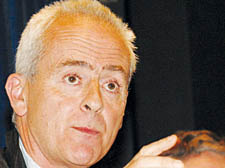| |

Guardian journalist Nick Davies speaking at the MWAW discussion |
Anti-war, and battling for a free press
Media debate focuses on fair ‘terror’ reporting and expresses concern over competition
SADDAM Hussein, Nelson Mandela, Osama Bin Laden: today’s enemies are tomorrow’s friends – and vice versa – in the fickle worlds of politics and media, a conference of journalists heard on Saturday.
“Nobody can say how big the threat is or who the enemy is,” Guardian commentator Peter Wilby, told the Media Workers Against the War (MWAW) conference at the London School of Economics.
“Maybe there are only 20 or so really serious terrorists and maybe they are not very good at what they do,” said Wilby.
MWAW was founded in 1990 by John Pilger and the late Paul Foot to campaign against the first Iraq war and is backed by the National Union of Journalists and the Stop the War Coalition.
More than 400 people, including senior representatives from across the media, convened for Saturday’s half-day conference where speakers included veteran socialist politician and broadcaster Tony Benn.
He condemned one-sided news-gathering and urged journalists to seek expertise, question the integrity of their editors and represent the alternative view.
Former Guantanamo Bay detainee Moazzam Begg spoke from experience of his treatment at the hands of the “sensationalist media”.
And members of the Campaign Against Sanctions and Military Intervention In Iran delivered a plea for the media to learn from the mistakes in Iraq and avoid the demonisation of Iran.
Sami Ramadani, a political refugee from Saddam’s regime and a senior lecturer in sociology at London Metropolitan University, challenged the mainstream view that pulling troops out of Iraq would result in more bloodshed.
Union representatives, journalists and concerned citizens took part in animated discussion on the anti-war movement, embedded journalism and Islamophobia.
The Guardian’s investigative reporter Nick Davies spoke about his new book, Flat Earth News, due out in February next year, for which he commissioned the Joseph Rowntree Foundation to measure journalists’ time in terms of column inches.
He said: “Journalists are filling three of four times as much space as they were in 1985 and they have just one third of the time to do it. We are not being allowed to do our jobs.”
Poorly resourced journalists reliant on a public relations nightmare: this, said Davies, is “churnalism”.
Sacked BBC journalist Andrew Gilligan referred to the Sunday Telegraph story of the Belly Dancers of Death who the paper’s “official sources” asserted had been deployed by Saddam Hussein to “infiltrate opposition circles, kill or maim dissidents”.
Both this story and claims of an Iraqi plot to smuggle weapons of mass destruction into Britain, concealed in bottles of under-arm deodorant, have since mysteriously disappeared from British cuttings’ libraries, said Gilligan.
He went on to criticise the culture of news journalism in which writers are pressurised to get scoops consisting of nothing more than the official line, a day earlier than the rest of the mainstream press.
The Press Complaints Commission has failed to protect the public from unreliable reporting, he said.
The audience questioned whether the commission could ever be capable of protecting the public and called for the creation of a legal body that would prevent “the dissemination of false propaganda”. |
 |
| |
|
|


